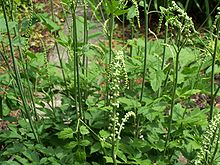Cimicifuga racemosa
| Actaea racemosa | |
|---|---|
 |
|
| Scientific classification | |
| Kingdom: | Plantae |
| (unranked): | Angiosperms |
| (unranked): | Eudicots |
| Order: | Ranunculales |
| Family: | Ranunculaceae |
| Genus: | Actaea |
| Species: | A. racemosa |
| Binomial name | |
|
Actaea racemosa L. |
|
Actaea racemosa (black cohosh, black bugbane, black snakeroot, fairy candle; syn. Cimicifuga racemosa) is a species of flowering plant of the family Ranunculaceae. It is native to eastern North America from the extreme south of Ontario to central Georgia, and west to Missouri and Arkansas. It grows in a variety of woodland habitats, and is often found in small woodland openings. The roots and rhizomes have long been used medicinally by Native Americans. Extracts from these plant materials are thought to possess analgesic, sedative, and anti-inflammatory properties. Black cohosh extracts are being studied as treatments for symptoms associated with menopause.
Black cohosh is a smooth (glabrous) herbaceous perennial plant that produces large, compound leaves from an underground rhizome, reaching a height of 25–60 cm (9.8–23.6 in). The basal leaves are up to 1 m (3 ft 3 in) long and broad, forming repeated sets of three leaflets (tripinnately compound) having a coarsely toothed (serrated) margin. The flowers are produced in late spring and early summer on a tall stem, 75–250 cm (30–98 in) tall, forming racemes up to 50 cm (20 in) long. The flowers have no petals or sepals, and consist of tight clusters of 55-110 white, 5–10 mm (0.20–0.39 in) long stamens surrounding a white stigma. The flowers have a distinctly sweet, fetid smell that attracts flies, gnats, and beetles. The fruit is a dry follicle 5–10 mm (0.20–0.39 in) long, with one carpel, containing several seeds.
...
Wikipedia
